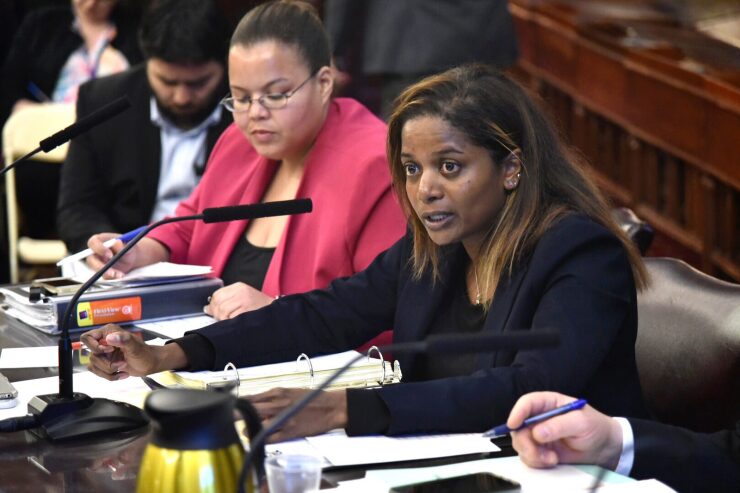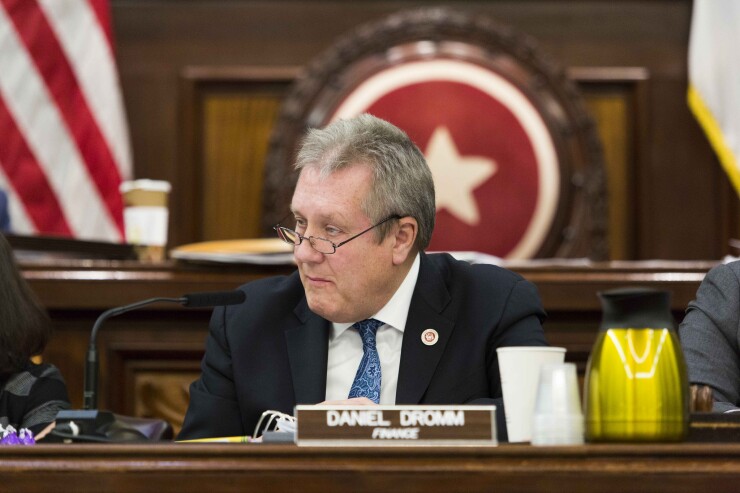New York City Council members question whether the levels of reserves in Mayor Bill de Blasio's $89.1 billion
"The money is there to bolster the city's reserves," council finance committee Chairman Daniel Dromm said at a City Hall hearing Thursday. He cited a $1 billion increase in the estimate of city funds by the Mayor's Office of Management and Budget and a pattern of previous June upticks to the spending plan.

De Blasio's plan maintains $1.25 billion in reserve funds within each year of a four-year financial plan and about $4.3 billion in a separate trust to help pay retiree health benefits.
The council, which must act on the budget by July 1, wants to add $500 million in reserves to buffer against a possible recession, budget cuts from the state and federal governments, and other threats such as terrorist attacks and storms. The council also wants to fund the "fair fares" subway discount for lower-income persons and provide a short-term property tax homeowner rebate.
"We're very confident about our levels of reserves," said city budget director Melanie Hartzog. "Our reserves are at historic levels."
Hartzog referenced the city's high bond ratings. Moody’s Investors Service rates the city’s general obligation bonds Aa2, while S&P Global Ratings and Fitch Ratings rate them AA. All three assign stable outlooks.
The city has $37.6 billion of general obligation debt as of March 31.
De Blasio's team and council will hash out the budget in June. "Things can get a little crazy near the end," said Dromm.
The $89.1 billion is less than one-half of 1% than the preliminary budget de Blasio announced in January. The budget has risen by 4.5% since last June, which Hartzog said is consistent with year-to-year growth over the past three years.
Nearly two-thirds of the increase since June relates to three funding areas, according to Hartzog: labor agreements, education and debt-service repayment.
“We must devote resources to paying down the bond debt that finances our capital program,” she said.
Debt service payments, she added, represent 11% of the budget growth since the last adoption. The bonds, she said, support school and hospital emergency room expansion, maintenance of New York City Housing Authority developments, and debt service on capital funds the city contributes to the Metropolitan Transportation Authority.
The city's reserve levels will probably be insufficient to sustain the city through a recession, said Ronnie Lowenstein, director of the nonpartisan watchdog
“But the reserves we currently have would be enough to provide the time to allow the council, the mayor and other policymakers to develop other ways to bring the budget into balance,” Lowenstein told council members.
Sizable reserves can also be counterproductive, said Lowenstein. State leaders pointed to the city’s reserve levels in assembling the FY19 state budget, taking measures that figure to cost the city more than $500 million in 2019 and nearly $300 million more annually through 2022.

“Determining the right level of reserves may be as much a political as a fiscal decision,” said Lowenstein.
City Comptroller Scott Stringer said adding $1 billion this year and next could provide the city a budget cushion of 12% of spending by fiscal 2021. The current level is 9%. "Doubling the agency savings target to 2% per year could get us halfway there," he said.
A 10% level, said Stringer, appears adequate “until Washington doesn’t help, you go to Albany and they don’t help, and suddenly you’re alone.”
In de Blasio's citywide savings program, said Stringer, only 14% of savings are “truly efficiencies” – the rest are debt service savings, funding shifts or spending re-estimates. “And however you categorize them, agency savings represent less than 1% of agency spending in the out years of the financial plan."
The efficiency savings ratio was roughly 20% under de Blasio's predecessor, Michael Bloomberg, according to
The potential budgetary impact of legalizing marijuana for recreational use in the state would be modest for the city with no impact on credit quality, Fitch Ratings said Thursday. "Fitch expects the decision to legalize in New York State, which as a whole would also see modest revenue gains, will be based on political and public policy considerations rather than budgetary ones."
A





